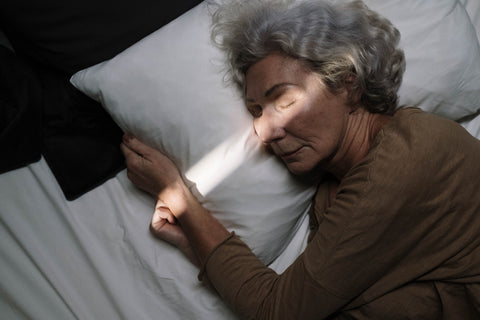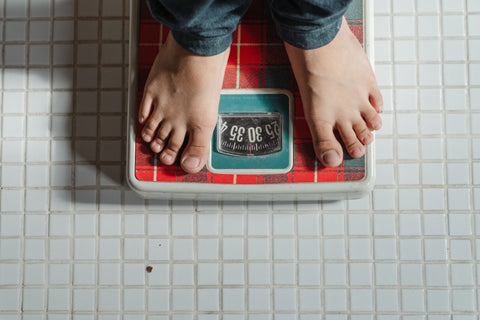
Did you know that your sleep schedule affects your weight loss? But maybe you are rolling your eyes because you heard some Instagram fitness influencers telling you how much sleep affects your health. This is true but it is also interesting how you can use this weapon to attain your goal.
The "Boring" but Insightful Knowledge: What is Circadian Rhythm?
I once had a boyfriend when I was younger who slept during the day and was awake at night. I could not understand why he was different. For months, I complained because it impacted our relationship. He finally went to see the somnologist who diagnosed him with a Non 24-Hour Sleep Wake Disorder. This explained why he was weird. I can try to explain to you what the term circadian code means but it won't be as coherent as how Satchin Panda explained it in his book, "The Circadian Code". He is a professor at the Salk Institute, a founding executive member of the Center for Circadian Biology at the University of California, and a leading expert in the field of circadian rhythm research. He described the circadian clock as the "internal timing system that interacts with the timing of light and food to produce our daily rhythms" (13). Circadian rhythms are 24-hour cycles that are part of the body’s internal clock, running in the background to carry out essential functions and processes.
Our body is designed to go through specific rhythms every day. Even our cells have their clock. And the reality is that any of us do not function in collaboration with our respective circadian rhythms which can result in diseases and allergies. Think of it as a dance, your body is dancing to a particular rhythm controlled by the SCN (suprachiasmatic nucleus). The SCN functions as the master circadian pacemaker that controls the timing of the sleep-wake cycle coordinating the circadian rhythms in other brain areas and tissue. Light does the job of communicating to your SCN that it is time to be alert.
What Happens When You Don't Respect Your Circadian Clock?
**Important**
An example of a scenario of this situation is when humans choose to eat at the wrong times. Panda Satchin describes this type of people as shift workers. They work odd hours and are not in tune with the body mechanism. People disobey their SCN cues because of a lack of self-awareness or negligence. Imagine one day you have to get up early to go to catch a flight from Los Angeles to Chicago and your schedule is disrupted. Instead of eating at 8:00 am., you "need" to eat at 6:00: After all, you've been taught that breakfast is the "most important meal of the day." When you sit down in front of your cereal bowl, you'll likely notice that you're not feeling hungry. That is because your brain has not sent the signal to your stomach to get the digestive juices ready to process your food. Your liver and the rest of your organs are not ready, either. With the first bite, your stomach will switch on its emergency mode and process the food. The body has to drop everything it is supposed to do at 6:00 am and turn its attention to the incoming food. Or it can ignore your food and it will stay undigested for a couple of hours. Typically, the body chooses the first option: It stops its usual before-breakfast activities, which include cleansing itself and running on stored energy. So, when the early breakfast appears, the body has to drop cleaning up and turn off the fat-burning switch so it can use the fresh food that you just ate as fuel.
What's more, the clock in your stomach, liver, muscles, pancreas, etc., will also take note of the unanticipated breakfast and will get confused. These clocks will think perhaps they are wrong and that it is 8:00 a.m. To make up for the "lost time," the clocks in these organs will try to speed up. But your circadian clock has many moving parts, and it is not that easy to speed up all the clocks in different organs so quickly and get them back into alignment. Usually, they can adjust themselves by an hour per day.
When you show up for breakfast the next day, it is 8:00 a.m. in Chicago but your body still thinks it is 6:00 a.m. in Los Angeles, and the stomach is still not ready. It goes to emergency mode and tries to process your food. And again it tries to speed up the clocks.
By day 4, you've created an entirely new circadian code that has adjusted your schedule. But guess what? It is time to go home. When you get back to Los Angeles and sit down for breakfast at 8:00 a.m., your system thinks it is 10:00. This time, the organs were ready for your breakfast appointment at 6:00, but they did not get any food. So they started the next task on their lists. As soon as you eat your breakfast, your stomach, liver, muscles, pancreas, etc., have to now drop what they were doing or turn their attention to processing your breakfast. This time, they choose to multitask. Again, the clocks try to rest to the new breakfast time by slowing down for the next few days.
This example shows how an erratic breakfast time confuses your organs and comprises their function. Using the circadian clock, each organ is programmed to process food for a few hours starting from breakfast. If your breakfast was 8:00 a.m., then the system works optimally for 8 to 10 hours. Every time we eat, the entire process of digestion, absorption, and metabolism takes a couple of hours to complete. Even a small bite of food takes an hour or two to be processed. After about a 10-hour window, the gut and metabolic organs will continue to work on your food, but their efficiency slowly goes down as they are not programmed to be open for business 24-7. The clocks in different organs are not that efficient. Your gastric juice and gut hormones are produced at a different rate and your digestion slows down, giving you a sense of indigestion or acid reflux.
What's more, just like a late breakfast interferes with the other tasks your organs have to accomplish, a late dinner will, too. This time, the disruption is more severe. The same food that would have taken a couple of hours to digest at 6:00 p.m. takes longer to digest at 8:00 because you are outside of that optimal 10-hour window. This extra work interferes with the next tasks by delaying or even completely removing that task from the list.
What Happens When Circadian Rhythms Break Down?
- ADHD
- Autism
- SAD
- Anxiety
- Panic attack
- Depression
- Compromised learning
- Nocturnal epilepsy
- Bipolar syndrome
- ICU Delirium
- Migraine
- PTSD
- Seizure
- Mania
- Psychosis
- Multiple Sclerosis
- Huntington Disease
- Alzheimer's Disease
- Bacterial Infection
- Sleeping sickness
- Malaria
- Arthritis
- Asthma
- Allergy
- Lymphoma
- Polycystic ovarian syndrome
- Irregular menstrual cycle
- Postpartum depression
- Inability to conceive
- Morning sickness
- Miscarriages
- Leaky gut
- Indigestion
- Heartburn
- Stomach pain
- Crohn's disease
- Ulcerative colitis
- Inflammatory bowel syndrome
- Inflammatory bowel disease
- Metabolic syndrome
- Weight gain/Obesity
- Childhood obesity
- Type 2 Diabetes
- Prediabetes
- Stroke
- Dyslipidemia
- Hypertension
- Heart Arrhythmia
- Chronic Kidney Disease
- Fatty Liver Disease (NAFLD)
- Steatohepatitis (NASH)
- Ovarian cancer
- Breast cancer
- Liver Fibrosis
- Colon cancer
- Liver cancer
- Lung cancer
- Insomnia
- Prader-Willie syndrome
- Smith-Magenis syndrome
- Obstructive Sleep Apnea
- Delayed sleep phase syndrome
- Non-24-hour sleep awake syndrome
- Familial advanced sleep phase syndrome
How come good sleep is necessary for weight loss?
The reason why sleep is important to weight loss is that the time you eat is very essential to your goal of weight loss. As an adult, it is better to sleep 7-8 hours every night. It helps to do the following:
- Sleep can boost your immune system
- It helps to prevent weight gain
- Sleep helps to strengthen your heart
- It improves your mood
- It increases productivity
- It helps to improve exercise
- It improves memory
Panda, S. (2018) researched to discover the impact of a low-calorie diet. They put mice on a diet, and the mice ate the same breakfast when they first woke up. The mice lost weight. Panda, S explains that "the mice lost weight because their eating pattern was aligned with their circadian code" (96). Another study was done where a group of Harvard scientists discovered that "individuals who spread their calories over a long period which means they eat the same amount of calories but eat later into the night did not lose weight. However, people who ate bigger meals during the day and refrained from eating at night lost a substantial amount of weight" (97). This is why it is very important to have a good sleep schedule so you can be able to eat your bigger meals earlier in the day. By doing so, you are training your body to prepare for sleep early. It will slowly result in fewer sweet cravings at night.
Tips for Better Sleep
- Don't look at your watch/clock/phone when you cannot get to sleep or if you wake up in the middle of the night.
- Don't create stress around bedtime or worry about that you will wake up late the next day.
- Don't create stress about your last night's sleep and worry that you'll have the same bad experience again. You are in control of your sleep.
- Don't create stress about the number of hours you're currently sleeping.
- Don't use the bedroom for anything other than sleep. It is not a study or a living room or a home theater.
Best Ways to Wake Up
- The best way to wake up refreshed is to have enough sleep by going to bed early.
- Get some bright light immediately after waking up. Get as close to the window as possible.
- Take a quick, 5 to 15-minute morning walk. Do anything that will take you out of the house and into bright daylight.
- Try to be consistent and wake up at the same time every day. If you are waking up 2 hours later on the weekends, it is a fair sign that you are not getting restorative sleep during the week.

